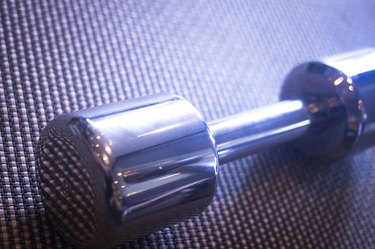
Gaining muscle after sleeve gastrectomy surgery might seem like an impossible task, but it can be done. In many cases, the weight you lose as a result of the surgery will reveal muscles that have developed after carrying so much extra weight for so long -- a common phenomenon in adults living with obesity. Light strength training along with a proper diet can help keep your muscles toned and in shape, but you should consult your doctor before beginning any type of exercise regimen.
Vertical Sleeve Gastrectomy
Video of the Day
A vertical sleeve gastrectomy is an operation performed in adults living with severe obesity that have not responded to exercise and diet. The surgeon removes about 80 to 85 percent of your stomach during the procedure, leaving the remaining part in the shape of a small banana. It is a laparoscopic procedure, which means the surgeon uses small incisions to access your stomach, as well as a small camera known as a laparoscope to guide him during the surgery. A smaller stomach limits the amount of food that can be consumed at one time, helping you feel fuller more quickly.
Video of the Day
Muscle Building
Immediately following your procedure, you will most likely be asked to refrain from strenuous activity for four to six weeks. After that period, you can usually begin training -- after getting your doctor's permission -- using weights or by performing body resistance exercises. Start by working out with lighter weights or performing exercises that you can execute for at least one set of eight to 12 repetitions each. Work each of your major muscle groups, including your back, shoulders, arms, legs and hips. Exercise your abdomen gently. Because you will most likely be on a special liquid diet for several weeks after your surgery, you may feel weak at first. Avoid pushing yourself too hard the first few weeks and stop exercising if you feel tired or faint. Gradually work your way up to a more vigorous exercise routine over a period of several weeks.
Importance of Diet
Helping to build muscle isn't just a matter of working your muscles. You need to have the proper diet to give your muscles the right nutrients they need to grow and function properly. One of the most important things to have in your diet, particularly after surgery, is plenty of lean protein. Lean meats, tofu, beans and low-fat dairy products are good sources for this type of protein. Work closely with your dietitian to help keep your energy up. Inform her of your workout schedule and follow the advice you are given. You may also be advised to take supplements or protein shakes along with your regular diet.
Considerations
One of the biggest mistakes people make after surgery, according to the Murfreesboro Surgical Specialists, is waiting too long before starting to exercise. One thing that can help you get motivated is to hire a certified personal trainer. A trainer can create a specialized workout regimen for your needs and keep an eye out for any potential injury. In addition to strength training, a trainer can guide you in performing cardiovascular exercises and a stretching regimen to help keep you balanced.